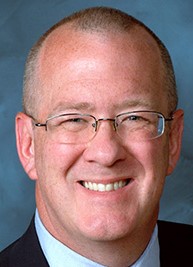EP 882 The Long Tail of Trump’s Economic Policies
 Whether your focus is on tariffs, the independence of the Federal Reserve or the reconciliation law and its tax and debt implications, the first six months of the second Trump Administration will have far-reaching effects on the American economy. Perhaps, it’s most important to watch the bond market reaction to the falling value of the dollar in relation to other currencies to forecast whether America’s dominance as the world’s economic engine is stalling. Given all that has transpired since his last visit, we decided to invite economist Michael Hicks back to put this whirlwind of activity in focus–to the extent anyone call follow the many mixed economic signals coming from this White House. Hicks is the George and Frances Ball Distinguished Professor of Economics and Director of the Center for Business and Economic Research at Ball State University in Indiana. His critiques are sharp and insightful, as you will hear on this podcast.
Whether your focus is on tariffs, the independence of the Federal Reserve or the reconciliation law and its tax and debt implications, the first six months of the second Trump Administration will have far-reaching effects on the American economy. Perhaps, it’s most important to watch the bond market reaction to the falling value of the dollar in relation to other currencies to forecast whether America’s dominance as the world’s economic engine is stalling. Given all that has transpired since his last visit, we decided to invite economist Michael Hicks back to put this whirlwind of activity in focus–to the extent anyone call follow the many mixed economic signals coming from this White House. Hicks is the George and Frances Ball Distinguished Professor of Economics and Director of the Center for Business and Economic Research at Ball State University in Indiana. His critiques are sharp and insightful, as you will hear on this podcast.
Podcast: Play in new window | Download
 How does America end up with a Secretary of Health and Human Services who is at such great odds with physicians in America on the essential safety and efficacy of vaccines? Leading medical organizations are now suing Robert F. Kennedy, Jr. over his agency’s COVID-19 recommendations regarding vaccines for children and those who are pregnant. And while that is the latest pushback, Dr. Jake Scott, a clinical Professor of Infectious Diseases at Stanford University, has been quite vocal about the falsehoods and patent nonsense that the HHS Secretary spews on the subject of vaccines. He curates an open database of hundreds of controlled vaccine trials. Among his numerous concerns are falsehoods about the number of shots children are required to have (state by state), the safety of the widely used vaccines, and the claims of conflict of interest which resulted in the dissolving of members of the Advisory Committee on Immunization Practices. He comments on a range of issues in this sphere, including the measles outbreak we are seeing currently and what it portends for the health of America’s children.
How does America end up with a Secretary of Health and Human Services who is at such great odds with physicians in America on the essential safety and efficacy of vaccines? Leading medical organizations are now suing Robert F. Kennedy, Jr. over his agency’s COVID-19 recommendations regarding vaccines for children and those who are pregnant. And while that is the latest pushback, Dr. Jake Scott, a clinical Professor of Infectious Diseases at Stanford University, has been quite vocal about the falsehoods and patent nonsense that the HHS Secretary spews on the subject of vaccines. He curates an open database of hundreds of controlled vaccine trials. Among his numerous concerns are falsehoods about the number of shots children are required to have (state by state), the safety of the widely used vaccines, and the claims of conflict of interest which resulted in the dissolving of members of the Advisory Committee on Immunization Practices. He comments on a range of issues in this sphere, including the measles outbreak we are seeing currently and what it portends for the health of America’s children. We may be the only podcast to continue the conversation about our responses to COVID, but that’s fine with me. It’s that important because we will be there again and yet we’ve barely touched the surface in doing a serious examination of our public policy responses. The COVID pandemic quickly led to the greatest mobilization of emergency powers in human history. By early April 2020 half the world’s population-3.9 billion people-were living under quarantine. People were told not to leave their houses; businesses were shuttered, employees laid off and schools closed for months or even years. In their book “In COVID’s Wake: How Our Politics Failed Us”, Frances Lee and our guest, Stephen Macedo, ask and dissect important questions: why did we ignore pre-COVID plans for managing a pandemic? Were the voices of reasonable dissent treated fairly? Did we weigh the costs and benefits of different policy options? It’s an important conversation and if we’re the only ones still having it, so be it.
We may be the only podcast to continue the conversation about our responses to COVID, but that’s fine with me. It’s that important because we will be there again and yet we’ve barely touched the surface in doing a serious examination of our public policy responses. The COVID pandemic quickly led to the greatest mobilization of emergency powers in human history. By early April 2020 half the world’s population-3.9 billion people-were living under quarantine. People were told not to leave their houses; businesses were shuttered, employees laid off and schools closed for months or even years. In their book “In COVID’s Wake: How Our Politics Failed Us”, Frances Lee and our guest, Stephen Macedo, ask and dissect important questions: why did we ignore pre-COVID plans for managing a pandemic? Were the voices of reasonable dissent treated fairly? Did we weigh the costs and benefits of different policy options? It’s an important conversation and if we’re the only ones still having it, so be it. The far right has been masterful at manipulating class anger to outmaneuver progressive goals and liberals often put ‘the smoking gun’ right in the hands of their political opponents. Can this tendency be reversed? Yes, but a lot of work needs to be done to change messengers, messaging and there needs to be a blunt focus on bread and butter issues. In her new book, “Outclassed: How the Left Lost the Working Class and How to Win Them Back,” Joan Williams, a scholar of issues relating to social inequality, Joan Williams meticulously combs through the data to explain why Democrats lost to a once disgraced and maligned, Donald Trump, following his 2020 loss. Who did he win over–and why? She explores the growth that he demonstrated among what once were considered strong adherents to the Democratic Party, as far back as FDR and the New Deal. As an atypical Republican, he found a voice that spoke to class concerns borne of the neoliberal economic policies from the 1970’s on. Since class is such an important determinant in our politics today, go to classbubblequiz.com and see where you stand in this equation.
The far right has been masterful at manipulating class anger to outmaneuver progressive goals and liberals often put ‘the smoking gun’ right in the hands of their political opponents. Can this tendency be reversed? Yes, but a lot of work needs to be done to change messengers, messaging and there needs to be a blunt focus on bread and butter issues. In her new book, “Outclassed: How the Left Lost the Working Class and How to Win Them Back,” Joan Williams, a scholar of issues relating to social inequality, Joan Williams meticulously combs through the data to explain why Democrats lost to a once disgraced and maligned, Donald Trump, following his 2020 loss. Who did he win over–and why? She explores the growth that he demonstrated among what once were considered strong adherents to the Democratic Party, as far back as FDR and the New Deal. As an atypical Republican, he found a voice that spoke to class concerns borne of the neoliberal economic policies from the 1970’s on. Since class is such an important determinant in our politics today, go to classbubblequiz.com and see where you stand in this equation. Americans spend endless hours growing, tending, and cutting their lawns. In fact, 40 million acres of land in the United States is covered by turf grass, making it the most irrigated crop in the country. To what end? It has virtually no value to flora and fauna and there are so many other ways to make your yard an oasis for the birds, bees, wildlife, flowers and trees. As we all wonder what we can do to help with the threats to biodiversity today and ameliorate the effects of global warming, the best thing to do is start in your own backyard. In her beautifully designed book “Grass Isn’t Greener: The Everyday Conservationist’s Guide to Bringing Nature to Your Yard,” Danae Wolfe, a conservation educator and skilled photographer, illustrates her cogent points page after page and picture after picture. We discuss creating spaces to support wildlife and the natural world without leaving home.
Americans spend endless hours growing, tending, and cutting their lawns. In fact, 40 million acres of land in the United States is covered by turf grass, making it the most irrigated crop in the country. To what end? It has virtually no value to flora and fauna and there are so many other ways to make your yard an oasis for the birds, bees, wildlife, flowers and trees. As we all wonder what we can do to help with the threats to biodiversity today and ameliorate the effects of global warming, the best thing to do is start in your own backyard. In her beautifully designed book “Grass Isn’t Greener: The Everyday Conservationist’s Guide to Bringing Nature to Your Yard,” Danae Wolfe, a conservation educator and skilled photographer, illustrates her cogent points page after page and picture after picture. We discuss creating spaces to support wildlife and the natural world without leaving home. When Roe v. Wade was overturned by the U.S. Supreme Court in 2022 in the Dobbs. vs. Jackson Women’s Health Organization case, it was the decision that anti-abortion activists had been waiting to see for over 50 years. While the decision did not ban abortions nationwide, it did throw the matter back to the states. Some states had trigger laws at the ready which would activate anti-abortion legislation once such a ruling came down. Other states, which were pro-choice, got busy as well in trying to protect and expand women’s reproductive rights in various ways, including many which would help make it easier for women in the anti-abortion states to have the procedure in their state. Donors and providers also got to work, as the former have given pro-choice groups new resources and the latter became very creative in how they expanded their services. David Cohen and our guest, Carole Joffe, have co-authored a book called “After Dobbs: How the Supreme Court Ended Roe but Not Abortion.” The book contains stories of people on the front line of this ongoing battle for abortion-related care. Carole reveals an amazing fact about the number of abortions in America since the decision came down. Stay tuned for that.
When Roe v. Wade was overturned by the U.S. Supreme Court in 2022 in the Dobbs. vs. Jackson Women’s Health Organization case, it was the decision that anti-abortion activists had been waiting to see for over 50 years. While the decision did not ban abortions nationwide, it did throw the matter back to the states. Some states had trigger laws at the ready which would activate anti-abortion legislation once such a ruling came down. Other states, which were pro-choice, got busy as well in trying to protect and expand women’s reproductive rights in various ways, including many which would help make it easier for women in the anti-abortion states to have the procedure in their state. Donors and providers also got to work, as the former have given pro-choice groups new resources and the latter became very creative in how they expanded their services. David Cohen and our guest, Carole Joffe, have co-authored a book called “After Dobbs: How the Supreme Court Ended Roe but Not Abortion.” The book contains stories of people on the front line of this ongoing battle for abortion-related care. Carole reveals an amazing fact about the number of abortions in America since the decision came down. Stay tuned for that. States, one by one, began legalizing marijuana, back in 2012 with Colorado leading the way. It was sold to the public as a way to unclog the criminal justice system, bring tax revenue and strong regulation, which would ensure quality. In truth the record shows that illegal shops have grown in number even in states with legal shops. Take New York state. In New York City itself there are 140 legal shops and 8,000 unlicensed dealers who can undercut the price of the product and for which no tax revenue is collected. And to add to the story of unintended consequences, in general today’s marijuana often exceeds 20 percent THC content compared to 3-5 percent in the pot of the 1990’s. Given that the legalization has resulted in former light users becoming daily users, the health consequences can only be bad. It may take years, but one day there will be a reckoning like we have seen with tobacco. Joining us to discuss all things marijuana and its new place in American society is Keith Humphreys a professor at Stanford University who specializes in drug policy.
States, one by one, began legalizing marijuana, back in 2012 with Colorado leading the way. It was sold to the public as a way to unclog the criminal justice system, bring tax revenue and strong regulation, which would ensure quality. In truth the record shows that illegal shops have grown in number even in states with legal shops. Take New York state. In New York City itself there are 140 legal shops and 8,000 unlicensed dealers who can undercut the price of the product and for which no tax revenue is collected. And to add to the story of unintended consequences, in general today’s marijuana often exceeds 20 percent THC content compared to 3-5 percent in the pot of the 1990’s. Given that the legalization has resulted in former light users becoming daily users, the health consequences can only be bad. It may take years, but one day there will be a reckoning like we have seen with tobacco. Joining us to discuss all things marijuana and its new place in American society is Keith Humphreys a professor at Stanford University who specializes in drug policy. These are tricky waters to navigate, but two scholars, Jessi Streib and Betsy Leondar-Wright, have co-authored a book called “Is It Racist? Is It Sexist?: Why Red and Blue White People Disagree, and How to Decide in the Gray Areas,” wade through it in their new book. It’s based on interviews with 125 white interviewees from many parts of the country and the result is a new way of understanding how inequalities persist by focusing on the individual judgment calls that lead us to decide what’s racist, what’s sexist, and what’s not. While they found a tendency to describe some people as ‘convictors’ and others as ‘acquitters’, as in a jury setting, they offer a very interesting metaphor of being more of a surveyor in determining what a set of facts, put in context, may tell us about situations we can all imagine happening, but may come to different conclusions as to ‘why.’ Our guest, Betsy Leondar-Wright, was somewhat heartened in this exploration to find that few people harbored explicit racial hostility toward people of color, but perceptions about the role of our history and that which is embedded in our institutions may not always rise to the surface when contemplating how certain actions toward ‘others’ occur.
These are tricky waters to navigate, but two scholars, Jessi Streib and Betsy Leondar-Wright, have co-authored a book called “Is It Racist? Is It Sexist?: Why Red and Blue White People Disagree, and How to Decide in the Gray Areas,” wade through it in their new book. It’s based on interviews with 125 white interviewees from many parts of the country and the result is a new way of understanding how inequalities persist by focusing on the individual judgment calls that lead us to decide what’s racist, what’s sexist, and what’s not. While they found a tendency to describe some people as ‘convictors’ and others as ‘acquitters’, as in a jury setting, they offer a very interesting metaphor of being more of a surveyor in determining what a set of facts, put in context, may tell us about situations we can all imagine happening, but may come to different conclusions as to ‘why.’ Our guest, Betsy Leondar-Wright, was somewhat heartened in this exploration to find that few people harbored explicit racial hostility toward people of color, but perceptions about the role of our history and that which is embedded in our institutions may not always rise to the surface when contemplating how certain actions toward ‘others’ occur. High in the Arctic, myth is melting into reality: as temperatures rise, newly ice-free waters are turning the Northwest Passage from a fable into navigable waterways. And while global superpowers, like America, Russia and China, see great economic benefit in finding a northern route that can act as a new superhighway for goods to equal the Panama and Suez Canals, at the same time we are losing sight of the real impacts on Arctic peoples, wildlife, and ecosystems. Global warming is ravaging the Arctic-and threatening the planet’s stability-while we jockey for position for control of emerging waterways. Kieran Mulvaney explores all of these issues in his great new book, “Arctic Passages: Ice, Exploration, and the Battle for Power at the Top of the World.” He is our guest today and, yes, we talk about President Trump’s Greenland fascination as well as the best tourist option for getting close to polar bears.
High in the Arctic, myth is melting into reality: as temperatures rise, newly ice-free waters are turning the Northwest Passage from a fable into navigable waterways. And while global superpowers, like America, Russia and China, see great economic benefit in finding a northern route that can act as a new superhighway for goods to equal the Panama and Suez Canals, at the same time we are losing sight of the real impacts on Arctic peoples, wildlife, and ecosystems. Global warming is ravaging the Arctic-and threatening the planet’s stability-while we jockey for position for control of emerging waterways. Kieran Mulvaney explores all of these issues in his great new book, “Arctic Passages: Ice, Exploration, and the Battle for Power at the Top of the World.” He is our guest today and, yes, we talk about President Trump’s Greenland fascination as well as the best tourist option for getting close to polar bears. Congress authorized the Justice Department to conduct civil investigations into constitutional abuses by police, such as excessive force or racially motivated policing back in 1994 as a response to the beating of Rodney King, a Black man, by white Los Angeles police officers. And in the wake of the George Floyd killing at the hands of police in Minneapolis, new federal legislation was contemplated, but never passed, and the Justice Department launched 12 ‘pattern and practice’ investigations into police departments scattered across the country. The Biden Administration’s Justice Department, under Merrick Garland, was slow, however, to enter into court-binding consent decrees that would be binding now. The Trump Justice Department has no interest in pursuing these cases and, in fact, about 100 lawyers in the civil rights division have quit because of the direction of their unit and the Department. So, basically, police reform in America is dead in this moment. To discuss the state of affairs is Jim Mulvaney, an adjunct professor in the Law and Police Science Department at John Jay College of Criminal Justice.
Congress authorized the Justice Department to conduct civil investigations into constitutional abuses by police, such as excessive force or racially motivated policing back in 1994 as a response to the beating of Rodney King, a Black man, by white Los Angeles police officers. And in the wake of the George Floyd killing at the hands of police in Minneapolis, new federal legislation was contemplated, but never passed, and the Justice Department launched 12 ‘pattern and practice’ investigations into police departments scattered across the country. The Biden Administration’s Justice Department, under Merrick Garland, was slow, however, to enter into court-binding consent decrees that would be binding now. The Trump Justice Department has no interest in pursuing these cases and, in fact, about 100 lawyers in the civil rights division have quit because of the direction of their unit and the Department. So, basically, police reform in America is dead in this moment. To discuss the state of affairs is Jim Mulvaney, an adjunct professor in the Law and Police Science Department at John Jay College of Criminal Justice.